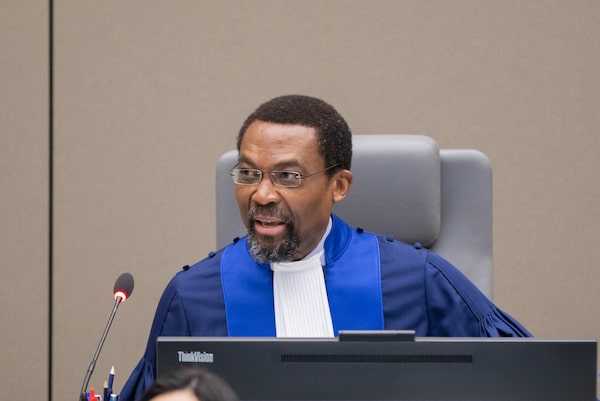
'I know where Canadian hearts will be on this,' said the ICC’s President, Justice Chile Eboe-Osuji, seen here on March 9, 2020.International Criminal Court
In its hour of need, confronting one of the toughest crises in its history, the International Criminal Court has turned to one of its earliest and staunchest allies: Canada.
The war-crimes court in The Hague is facing a sharp escalation in pressure from U.S. President Donald Trump, and this time it is personal. Earlier this month, Mr. Trump authorized a range of punishments, from asset freezes to travel bans, against any court employee who assists in an investigation of U.S. soldiers or security agents.
As many as 40 Canadians – including the court’s President himself – could potentially be exposed to the U.S. sanctions. But that didn’t stop the Canadian government from joining 66 other countries in rallying around the court this week. In a joint statement, without explicitly naming Mr. Trump, they vowed to stand up to the threats.
“I know where Canadian hearts will be on this,” said the ICC’s President, Justice Chile Eboe-Osuji. “I know that Canadian public opinion is on the side of justice: international criminal justice on behalf of the victims of atrocity crimes that the ICC was set up to give justice for,” he told The Globe and Mail this week.
The judge, elected to lead the international court in 2018, is a Canadian and Nigerian dual citizen who spent many years studying, teaching and practising law in Canada, beginning at the age of 26 as a graduate student at McGill University.
“For a long time, Canada has had a reputation of being a gentle, medium-level power that enters as the voice of reason and conscience on the international stage, and the current government is coming back to that role,” he said.
Justice Eboe-Osuji, whose three-year term as ICC President will expire next year, has embarked on an intense publicity campaign to defend the court against Mr. Trump’s actions. The U.S. threats are “barefaced coercion” that should worry anyone, he says.
The sanctions authorization, in a White House executive order, was a response to the court’s investigation of alleged war crimes, including alleged torture and rape, by U.S. soldiers and security agents in Afghanistan and at Eastern European detention centres for Afghan detainees.
Mr. Trump’s Secretary of State, Mike Pompeo, said the planned asset freezes and travel bans were necessary because the ICC was a politically motivated “kangaroo court” that jeopardized U.S. national security.
This went beyond the pale, Justice Eboe-Osuji said. “Something unprecedented happened, unprecedented to any international court that we know of, something unprecedented in any liberal democracy,” he said.
“It was done to deliberately mischaracterize and misrepresent the court and what it stands for and how it does its work. I felt it necessary and important to correct those misimpressions.”
ICC condemns Trump administration’s decision to authorize sanctions against court staff
Ottawa talking to Trump administration about U.S. sanctions threat to ICC staff
Canada’s reaction was muted at first. But this week the Trudeau government endorsed the global statement of support for the ICC. It tweeted that it is “opposed to actions taken against the Court and its officials.”
In their joint statement, the 67 countries pledged to protect the principles of international criminal justice “undeterred by any measures of threats against the Court, its officials and those co-operating with it.”
Justice Eboe-Osuji said he understands why Canada has to be careful about confronting Mr. Trump directly. “We know that Canada shares a very long border with the U.S., and much else,” he told The Globe.
“I trust that the government is strongly supportive of us, and doing the best that it can do to deal with this matter in its own way.”
Canada was among the earliest supporters of the ICC’s founding treaty and was the first country to pass comprehensive legislation to put the treaty into effect. It is also the seventh-biggest contributor to the ICC’s budget, providing more than $10.5-million this year alone.
Mark Kersten, a Canadian scholar who specializes in ICC issues, said the court is becoming more assertive in response to Mr. Trump’s pressure tactics. “The court is mobilizing in a way that it hasn’t before,” he told The Globe.
“Traditionally, ICC officials would try to persuade the United States to remain friendly with the court. Now you see a shift to condemnation of Washington’s tactics.”
The U.S. campaign against the court could be stressful for many ICC employees, since the Trump administration is even threatening to impose a travel ban on their family members. The potential “chilling effect” of Mr. Trump’s threats is “a source of worry” – but will not discourage the court’s employees, Justice Eboe-Osuji said.
The ICC, he notes, is a court of last resort for those who are unable to obtain justice anywhere else, for crimes that “shock the conscience of humanity” – a principle that the U.S. itself has supported in the past, at the Nuremberg trials after the Second World War and the tribunals for Rwanda and the former Yugoslavia in the 1990s.
“We work under the weight of the memory all those who died in atrocities in the past, and we have to keep faith with future victims of such atrocities,” he said. “This worries us more than whether our own trappings of comfort and joy might be stymied somewhere.”
 Geoffrey York
Geoffrey York